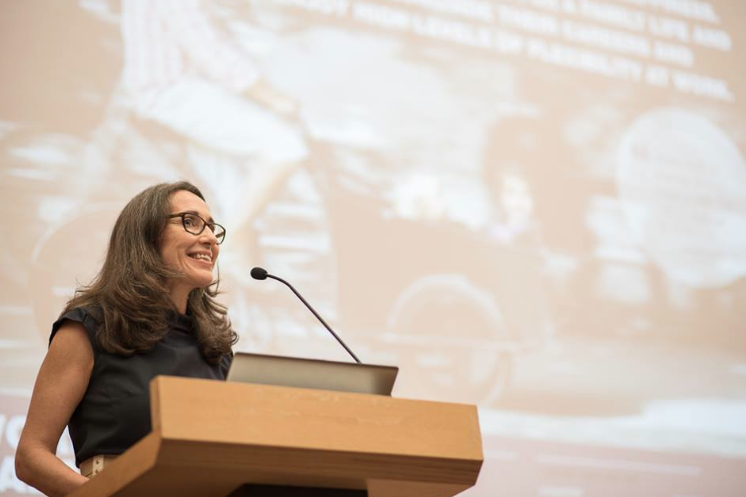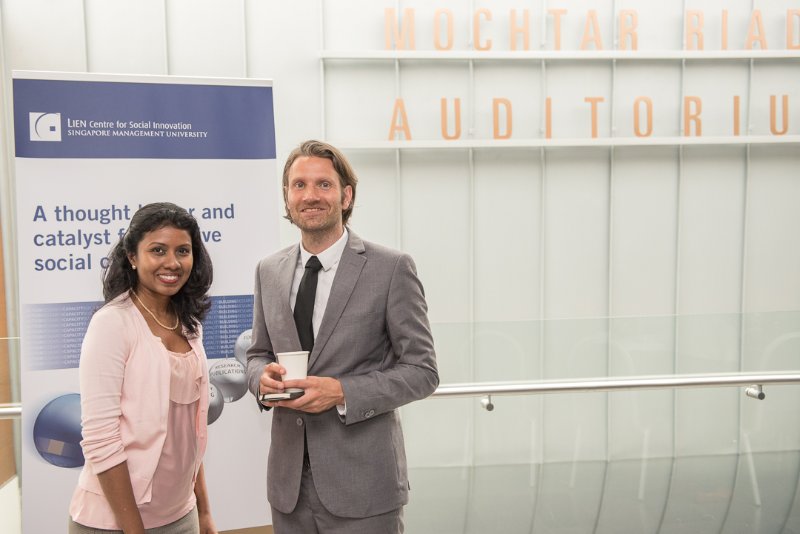Danish Recipe For Workplace Happiness
 Contributed by
Connected Women
July 21, 2016
Contributed by
Connected Women
July 21, 2016

Denmark, for the third time, topped the United Nations’ World Happiness Report ranking in 2016.
I interviewed Danish Ambassador Berit Basse in 2012 and Meik Wiking, CEO of the Denmark-based Happiness Research Institute recently. Here’s inspiration from them specifically on workplace happiness, which, by the way, is linked to higher performance, productivity, originality in thinking, teamwork, staff retention and more.
Ambassador Basse shared how work contributes to happiness for Danes:
People are encouraged to have influence and control over their own work. (Author note: Research by Dr Kenneth Thomas, author of Intrinsic Motivation at Work: Building Energy and Commitment, points to how having choice is important for intrinsic motivation. Research by the iOpener Institute for People and Performance has found that control over daily activities at work is one contributor of workplace happiness.)
Good relationships with colleagues are a major reason why people enjoy work. (Author note: There’s lots of research to support the importance of positive relationships at work. iOpener’s research on workplace happiness also supports this. )
People are committed to authentic goals. People tend to do what they sincerely want to do in life, instead of doing something that is expected of them by others. (Author note: She made this point in relation to Danish people in general, but if you apply this to doing work that one authentically chooses, then it becomes an additional factor for workplace happiness.)
Although they may not use the term “workplace happiness”, they do put a lot of focus on job satisfaction surveys.
Especially in the workplace, stress prevention and coping is a big priority. There’s a big focus on taking care of one’s health, also by the employer. People generally enjoy a 37-hour work week and excellent family-friendly policies. They have “flexicurity” which is the Danish model for enhancing flexibility and security in the labour market.
She also shared some of the cherished values in Denmark. You can see why the workplace would be a great place to be in if these are honoured there:
- The golden rule – treat others as you want to be treated
- Respect for others
- Initiative to identify problems and do something about it
- Openness to new ideas
- Truth

Ambassador Basse (pictured above) said that relationships are very important to the Danish – family, work, and community. And I could see that by promoting the golden rule and respect for each other, they have been building a nation of people who know how to treat each other well.
On 1 June 2016, Meik Wiking shared at the Happiness Seminar in Singapore that 94% of Danes are satisfied with working conditions and that seven out of ten Danes would continue to enjoy their current work even if they became economically independent. Denmark also ranked second in the OECD Better Life Index 2016. He spelt out aspects of work-life balance in Denmark:
- Five weeks’ paid holiday
- 52 weeks of parental leave, out of which the parents can receive up to 32 weeks of monetary support from the state
- The right to take time off on their children’s first day of illness
- Three out of four Danish children at the age of three or below are in childcare
- He said companies support autonomy and flexibility: 25% of Danes are empowered to decide on their working hours, and 17% of them are actively carrying out a proportion of their work at home
I did a super-quick interview with him (pictured below) and asked how he creates a positive work culture for his own team. He said:
“We encourage [the staff] to make use of the flexibility and autonomy that we have. I encourage my people to work from home and to take walks during the day during office hours to clear the head.
“We don’t have a sterile, white office. We have sofas. So if you’re reading a report, might as well do it on the sofa than at your desk.
“I personally tell my employees to pay attention to their hour-by-hour energy. Every afternoon at 3 or 4 o’clock, if I feel that my productivity is going down, I would rather go home, get some exercise, spend time with people I love and then switch back in when I am re-energised and more productive later in the evening, instead of just sitting in the office when not feeling productive.”
Energy! It affects us in a big way but it may not be something many of us pay attention to at work. I love this self-awareness that Meik encourages. If we love the people we work with, that can help a lot in staying energised or bouncing back from a dip in energy after a supportive, enlivening conversation with them.
I asked him what makes him happy at work. This was his $200,000 answer:
“Studies show that the main factor for happiness at work is a sense of purpose and I have an incredible sense of purpose. I make less money than I used to in my old job. I work more hours but I am having a lot more fun. It’s amazing to have a job where even if somebody came tomorrow and offered me a job for $200,000 per month, I would say no.”

The Happiness Research Institute has published the Job Satisfaction Index 2015, which details the six factors behind job satisfaction – purpose, leadership, your influence over working conditions, achievements, work-life balance, and colleagues.
Once in a while, when I share inspiration from other countries or about specific organisations in Singapore doing great work, people tell me why this would not work in their own setting or they may criticise the source of inspiration. No country/organisation is perfect, but I believe everyone has something to teach. When we stay open, inspired, have a learning mind-set and focus on what we CAN take and apply in whatever little spheres of influence each of us has, change will happen. It already is!
What inspires you most about the Danish way? What is one actionable idea that you are taking away?
Gratitude to Ambassador Basse and Meik Wiking for making time to speak with me with a generous spirit of sharing, and to Lisbet Anderson from the Royal Danish Embassy, Singapore for making the interview with Miek happen and staying connected and open.
This post was first published on Vadivu Govind's LinkedIn blog and has been reposted on Executive Lifestyle with the permission of the author.
Edited by Nedda Chaplin
Photographs: Happy women enjoying a coffee in a cafe in Copenhagen from Shutterstock, Sebastien Teh of Retouched Photography (photos of Ambassador Basse, Meik Wiking and me)
Did you enjoy this post? Please comment, like and share!










Sorry, the comment form is closed at this time.